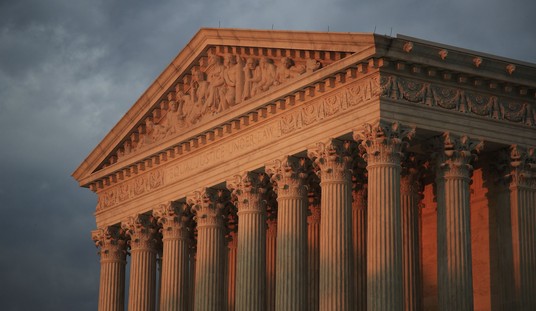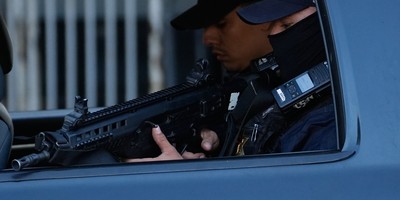The Iran talks' already-extended deadline has been extended again, and is likely to stretch on for days:
"But in one hotel where some negotiators were staying, the State Department extended their rooms until Saturday" https://t.co/ZeH7j22hkJ
— Noah Pollak (@NoahPollak) July 7, 2015Advertisement
From Reuters' new story:
Iran and six major powers will keep negotiating past Tuesday's deadline for a long-term nuclear agreement as they tackle the most contentious issues, including the continuation of a U.N. arms embargo on Iran, the big powers said. "We are continuing to negotiate for the next couple of days. This does not mean we are extending our deadline," EU foreign policy chief Federica Mogherini said outside the hotel where the talks between Iran, Britain, China, France, Germany, Russia and the United States are taking place. Russian Foreign Minister Sergei Lavrov said there was "every reason" to believe a deal would be done within "a few days", and that there was an "understanding" that most of the current sanctions against Iran would be lifted. "There is only one big problem in terms of sanctions - it is the problem of a weapons embargo," he told journalists, according to the news agency Interfax. He said it was important to reach agreement on this as soon as possible, telling journalists that "ending the bans on supplies to Iran of the weapons required to fight terrorism is a very, very relevant objective". It is the fourth time the parties have extended the terms of the interim deal, which was struck in November 2013 and provided Iran with limited sanctions relief in exchange for a halt to the production of uranium enriched to a purity level of 20 percent.
So many points: Continuing negotiations past a deadline is an extension, period. Why they're playing semantics games about this is puzzling, given that this is "the fourth time the parties have extended the terms of the interim deal." The Russians are telling reporters that "most" of the current sanctions against Iran will be lifted under the agreement, with the biggest remaining problem on that front being the weapons embargo. The lifting of said embargo was an "unrelated,"
Recommended
Advertisement
White House officials see the conclusion of Iran talks as a gateway for Mr. Obama to press for a political resolution in Syria that would facilitate the exit of President Bashar al-Assad, a close Iranian ally...U.S. officials are unsure how a nuclear deal would affect Tehran’s behavior. Iran could firm its support for Mr. Assad or cut a deal to push him aside, U.S. officials said. “They’ll have more money to be bad actors if they choose to be bad actors,” another senior administration official said. “But they’ll also have more opportunities to be constructive if they choose that route.”
Advertisement
Welcome to fantasyland. If the Iranians choose the "constructive" route? The same Iranians whose international terrorism and meddling continues "undiminished," according to this administration's own assessment? Which further underscores the absurdity of the Russians' apparent support for lifting or reducing the UN arms embargo (which Tehran has habitually violated and subverted). Lavrov argues that Iran might need those weapons to combat terrorism. Iran is the planet's number-one state sponsor of terrorism. The Reuters piece above also describes the terms of the interim deal as forcing Iran to "halt" uranium enrichment…which they haven't. Tehran's stockpile has increased substantially over the course of the years-long negotiations. Indeed, the regime hasn't fully complied with the interim deal, giving rise to a flurry of excuses from the Obama administration. These apologias raise red flags for the Washington Post's editorial board:
If it is reached in the coming days, a nuclear deal with Iran will be, at best, an unsatisfying and risky compromise. Iran’s emergence as a threshold nuclear power, with the ability to produce a weapon quickly, will not be prevented; it will be postponed, by 10 to 15 years. In exchange, Tehran will reap hundreds of billions of dollars in sanctions relief it can use to revive its economy and fund the wars it is waging around the Middle East. Whether this flawed deal is sustainable will depend on a complex set of verification arrangements and provisions for restoring sanctions in the event of cheating. The schemes may or may not work; the history of the comparable nuclear accord with North Korea in the 1990s is not encouraging...That’s why a recent controversy over Iran’s compliance with the interim accord now governing its nuclear work is troubling. The deal allowed Iran to continue enriching uranium, but required that amounts over a specified ceiling be converted into an oxide powder that cannot easily be further enriched. According to the International Atomic Energy Agency, Iran met the requirement for the total size of its stockpile on June 30, but it did so by converting some of its enriched uranium into a different oxide form, apparently because of problems with a plant set up to carry out the powder conversion. Rather than publicly report this departure from the accord, the Obama administration chose to quietly accept it. When a respected independent think tank, the Institute for Science and International Security, began pointing out the problem, the administration’s response was to rush to Iran’s defense — and heatedly attack the institute as well as a report in the New York Times.
Advertisement
Classic Obama here. Dangerous weakness and accommodation in the face of our enemies, coupled with furious attacks against domestic critics. Also recall that Obama's fig leaf argument for a deal -- the lengthening of Iran's so-called "breakout" timeline -- has been seriously challenged by nuclear experts. And as the Post editorial points out, Iran's status as a threshold nuclear-armed stated will merely be postponed by this agreement, even if they fully comply with its terms. Obama himself has all but conceded this point. I'll leave you with the Free Beacon's video chronicling the depressing parade of concessions, rhetorical and substantive, served up by Team Smart Power on this front. Devastating:

























Join the conversation as a VIP Member